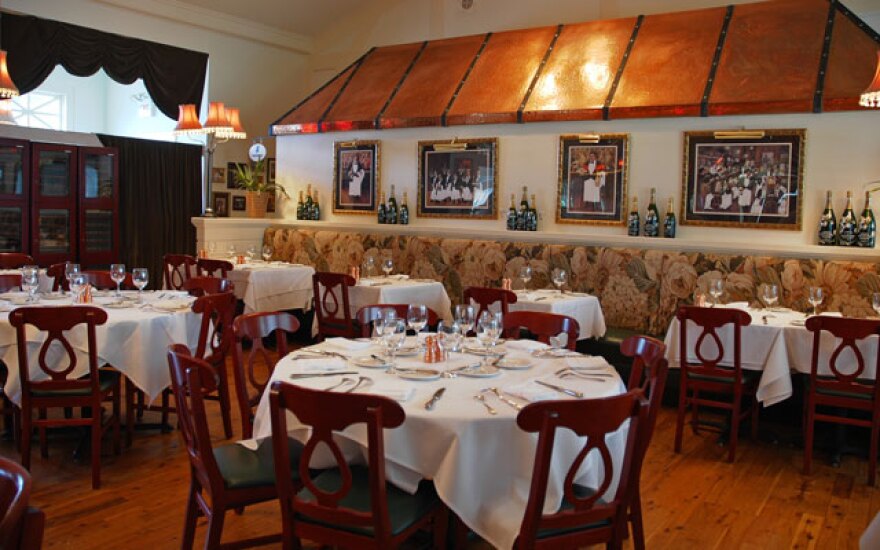Milwaukee's dining scene is growing up.The city's seen an explosion of new, widely-recognized restaurants over the last 40 years, and its residents' palettes are maturing alongside them.
"Milwaukee is in its early 20s as far as if it were a person," says "Wisconsin Foodie" host Kyle Cherek. "We know who we are, we're not scared about talking about our culinary scene anymore. We're starting to move into some dining trends and claim our own identity as a city of both chefs and eaters."
Cherek says this new dining enthusiasm had him thinking about how Milwaukee's dining scene developed since the 1970s. Back then, Milwaukee had a few fine dining restaurants based on the Escoffier/French style of fine cuisine.
But Cherek says the city lacked, what he called, "really engaging, inventive, terrific dining."
"We sort of did it with a few bright lights, but nothing amazing, and then our German trumped everything except the Germans," he says.
Then came Sanford D'Amato. He was among the first Americans to break into the French kitchens in New York in the 1970s and quickly made a reputation for himself. When he came back to Milwaukee to open his signature restaurant, Sanford, in 1989, Cherek says it represented a "crack of the first bright light that changed the dining scene in Milwaukee."
Cherek says it's hard to overstate how crucial the James Beard award-winning D'Amato was for changing Milwaukee's dining culture. Along with wife and business partner Angie, D'Amato early on managed to make a Milwaukee restaurant one of the 10 best dining institutions in the country, Cherek says - something that wasn't entirely recognized here at the time.
"It was, thank goodness, a type of cuisine that resonated on a national level so quickly that I think in some ways the foodie - we didn't have that term - intelligentsia of the nation caught up to their cuisine before some Milwaukee diners did," Cherek says. "Though they ate it and loved it, they didn't quite appreciate it for what it was in a broader sense."
D'Amato's transformative restaurant was followed by Joe Bartolotta's Ristorante Bartolotta in 1993 and Lake Park Bistro in 1995. By the early 2000s, more inventive restaurants were being opened by chefs who had trained under these talented, top chefs.

"When I talk to chefs about what did Sanford meant to you, in essence, the answer was everything," Cherek says. "He or they were the linchpin that made us believe or gave us a chance to imagine a different kind of dining scene in Milwaukee."
By the 2000s, new restaurants like The Social, Crazy Water and La Merenda had been opened by this new generation of chefs, who shifted toward "comfort casual food but with this better cooking etiquette," Cherek says.
But in 2008 Milwaukee's dining scene became an anomaly, Cherek says. Most cities saw restaurants fold due to the bad economy, but the opposite happened in Milwaukee.
"During the recession, we kept opening up all these great places as compared to the rest of the country and outpacing the rest of the country and they're staying open," he says. What's more, these restaurants are nationally recognized and feature award-winning chefs.
As the city becomes known as one that creates, and consumes, innovative food, chefs are beginning to experiment. Molecular cuisine is being introduced, and many chefs are pushing back against "corporate concepts."
"We're starting to move into some dining trends and claim our own identity as a city of both chefs and eaters." -Kyle Cherek, host and producer of "Wisconsin Foodie"
"Go to a lot of cities B-tier cities like us, their downtowns are filled with Applebee's and P.F. Chang's," Cherek says. "Instead we've got things that are owned here. There's that identity that we're really clinging to because it's there for us, and in other cities of our scale and population, they're filled with big guys who fly in from 30,000 feet."
As chefs are getting creative, Milwaukee's diners are also willing to try new things, Cherek says. That's crucial for the city's restaurant scene to keep up the pace, which Cherek isn't sure can last.
"This enthusiasm over the last four or five years of places opening up...is going to kind of have to implode a little bit, or this supernova will grow for another 10 or 12 years, and it really has everything to do with the dining public," he says. "It's our time to have great food, but we've got to go out and embrace it."
Cherek will be talking with Milwaukee chef Sanford D’Amato Saturday afternoon at the Wine & Dine event at the Wisconsin Center.






